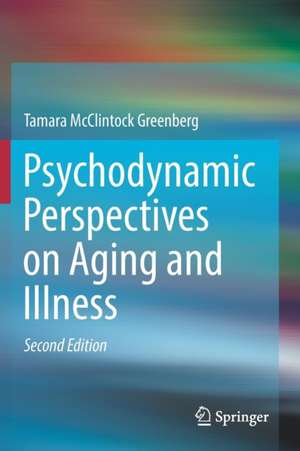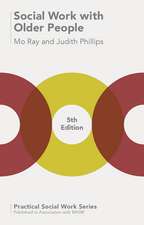Psychodynamic Perspectives on Aging and Illness
Autor Tamara McClintock Greenbergen Limba Engleză Paperback – 17 oct 2016
"The Second Edition of Psychodynamic Perspectives on Aging and Illness is a timely and superb revision which offers health-care professionals working at the mind/body interface a paradigm shift. For far too long, the wisdom of psychoanalysis as a tool to understand the suffering inherent in aging and illness has been devalued and neglected. With this update, Dr. Greenberg incontrovertibly corrects this lapse. Her integration of current scientific research, alongside a user-friendly discussion of the theory and practice of psychodynamic psychotherapy, is an important contribution to the psychology of medicine. Several topics are elaborated; the constructs of hysteria and somatization, the biology of stress, the impact of attachment history on coping with sickness as well as the experiences of trauma and grief. As with the first edition, the idea that the patient’s experience of illness cannot be understood without including the subjectivity of the practitioner who provides care is considered and done so with more awareness of this complexity. Each chapter now contains a section on “Suggested Techniques” that succinctly presents a guideline for applying the ideas set forth. Other no table aspects of the book are its reflections on the culture of medicine and the insights about the influences of contemporary Western life on the manifestation and adjustment to illness. This edition is, above all, essential for those practitioners dedicated to providing collaborative and interdisciplinary health-care which is both biologically and psychologically informed. As with the First Edition, it will continue to be required reading."
Marilyn S. Jacobs, Ph.D., ABPP, David Geffen School of Medicine at UCLA "A wonderful, well-researched, and important book that proves to be as much about humanity and resilience as it is about human psychology."
Lee Daniel Kravetz
Author of Supersurvivors: The surprising Link Between Suffering & Success
"Tamara McClintock Greenberg is one of the leading health psychologists of our time. In this second edition of her classic text, she corrects the much overlooked interface between the psychodynamics of aging, illness, and the doctor-patient relationship offering insights that no other practitioner or theorist has accomplished to date. Combining her training and expertise in psychology and behavioural medicine, she facilely navigates the turbid waters of how medical illness and aging is informed by unconscious dynamics, childhood familial relations, somatisation, coping and recovery, and the convergence of mind and body. Healthcare practitioners of all types who work therapeutically with chronically ill and older adults will find this to be a perspicacious and indispensible approach to clinical praxis."
Jon Mills, PsyD, PhD, C.Psych., ABPP, Professor of Psychology &Psychoanalysis, Adler Graduate Professional School, Toronto “In the second edition of Psychodynamic Perspectives on Aging and Illness Dr Tamara Greenberg makes a remarkable contribution to those who treat patients with medical illnesses as they age. Her psychodynamically informed approach to patients in later life couldn’t come at a better time as our population becomes older. Challenging the field's dogma that older patients are too set-in-their-ways to make personality changes, Dr Greenberg demonstrates in this book how wrong that notion was. We are all a work in-progress until the very end. This is a must-read practical book for therapists, nurses, families, physicians, family and estate lawyers, and health care navigators.”
Louann Brizendine, M.D., Professor and Author of "The Female Brain" and "The Male Brain" , Lynne and Marc Benioff Endowed Professor of Clinical Psychiatry, Founder/ Women's Mood and Hormone Clinic, UCSF
Universityof California, San Francisco This timely update of the bedrock text reflects what we now know—and are still finding out—about the benefits of psychodynamic psychotherapy for older adults facing chronic conditions. Expanding on the original, the author balances the physical and experiential factors affecting patients’ physical illnesses and related emotional distress while situating core psychodynamic constructs in the context of illness and aging. Special attention is paid to technique, giving therapists practical guidance on dealing with transference and countertransference issues, working with patients in cognitive decline, and navigating complexities of age, class, and culture. The book also reviews the current evidence on how and why psychodynamic therapy helps medical patients with coping, adapting, and healing.
Included in the coverage:
- Technology, idealization, and unconscious dynamics in the culture of medicine.
on Aging and Illness skillfully follows its predecessor as a powerful, plain-spoken mentor to therapists working in hospitals, long-term care facilities, and outpatient practice.
| Toate formatele și edițiile | Preț | Express |
|---|---|---|
| Paperback (2) | 335.84 lei 38-44 zile | |
| Springer International Publishing – 17 oct 2016 | 335.84 lei 38-44 zile | |
| Springer – 29 iun 2010 | 361.60 lei 43-57 zile | |
| Hardback (1) | 348.50 lei 38-44 zile | |
| Springer International Publishing – 15 dec 2015 | 348.50 lei 38-44 zile |
Preț: 335.84 lei
Preț vechi: 353.51 lei
-5% Nou
Puncte Express: 504
Preț estimativ în valută:
64.26€ • 67.28$ • 53.17£
64.26€ • 67.28$ • 53.17£
Carte tipărită la comandă
Livrare economică 02-08 aprilie
Preluare comenzi: 021 569.72.76
Specificații
ISBN-13: 9783319488493
ISBN-10: 331948849X
Pagini: 224
Ilustrații: XV, 209 p. 57 illus.
Dimensiuni: 155 x 235 x 12 mm
Greutate: 0.33 kg
Ediția:2nd ed. 2016
Editura: Springer International Publishing
Colecția Springer
Locul publicării:Cham, Switzerland
ISBN-10: 331948849X
Pagini: 224
Ilustrații: XV, 209 p. 57 illus.
Dimensiuni: 155 x 235 x 12 mm
Greutate: 0.33 kg
Ediția:2nd ed. 2016
Editura: Springer International Publishing
Colecția Springer
Locul publicării:Cham, Switzerland
Cuprins
When the Body Intrudes: Psychotherapy with Older and Medically Ill
Adults.- Technology, Idealization, and Unconscious Dynamics in the Culture of Medicine.- The Trauma of Medical Illness.- Narcissistic Aspects of Aging and Illness.- Grey Areas: When Illness May be Particularly Impacted by Psychological Variables.- Transference and Countertransference Considerations.- Self-Destructive Behaviors and Illness.- Cognitive Changes and Implications for the Therapeutic Encounter.- What We Know and What We Don’t: The Influence of Psychological Factors and Relationships on Medical Illness.- Hope and Grief: The Introduction of an Emotional Language.
Adults.- Technology, Idealization, and Unconscious Dynamics in the Culture of Medicine.- The Trauma of Medical Illness.- Narcissistic Aspects of Aging and Illness.- Grey Areas: When Illness May be Particularly Impacted by Psychological Variables.- Transference and Countertransference Considerations.- Self-Destructive Behaviors and Illness.- Cognitive Changes and Implications for the Therapeutic Encounter.- What We Know and What We Don’t: The Influence of Psychological Factors and Relationships on Medical Illness.- Hope and Grief: The Introduction of an Emotional Language.
Recenzii
“This book explains how psychodynamic theory can help with an understanding of older adults with chronic illnesses and teaches therapeutic techniques to help them work through challenges and provide hope and healing. … graduate students in psychology and social work would get great benefit as well. … The book ends with a discussion about the importance of providing hope in the midst of grief. This readable book contains helpful case vignettes.” (Gary B. Kaniuk, Doody's Book Reviews, May, 2016)
Notă biografică
Tamara McClintock Greenberg, PsyD, MS is an Associate Clinical Professor in the Department of Psychiatry at the University of California, San Francisco, where she supervises psychiatry residents. She has worked with medical and aging patients for the last twenty years in hospitals, long-term care facilities and in her outpatient practice. Dr. Greenberg is the author of four books and a number of contributed chapters, which have encompassed both academic and popular press writing. She has written for Psychology Today online, Psych Central and The Huffington Post. She has been a speaker to audiences and the media on topics such as aging, illness, the stresses associated with caretaking, grief, the trauma of illness, coping with aging, women’s issues and the application of psychodynamic ideas for people struggling with health problems and those that try to help them. A major focus of her writing has been on how loved ones and patients can deal with doctors and the medical system in a more empowered way, while being mindful of the difficult and unique stressors physicians and medical staff face in this ever-complicated medical landscape. Dr. Greenberg lives with her husband and two pugs in San Francisco.
Textul de pe ultima copertă
This timely update of the bedrock text reflects what we now know—and are still finding out—about the benefits of psychodynamic psychotherapy for older adults facing chronic conditions. Expanding on the original, the author balances the physical and experiential factors affecting patients’ physical illnesses and related emotional distress while situating core psychodynamic constructs in the context of illness and aging. Special attention is paid to technique, giving therapists practical guidance on dealing with transference and countertransference issues, working with patients in cognitive decline, and navigating complexities of age, class, and culture. The book also reviews the current evidence on how and why psychodynamic therapy helps medical patients with coping, adapting, and healing.
Included in the coverage:
Hope and grief: the introduction of an emotional language. The Second Edition of Psychodynamic Perspectives on Aging and Illness skillfully follows its predecessor as a powerful, plain-spoken mentor to therapists working in hospitals, long-term care facilities, and outpatient practice.
Included in the coverage:
- Technology, idealization, and unconscious dynamics in the culture of medicine.
- Narcissistic aspects of aging and illness.
- Grey areas: when illness may be particularly impacted by psychological variables.
- Cognitive changes and implications for the therapeutic encounter.
Caracteristici
Each chapter includes a separate section on psychodynamic techniques Expanded information on conceptualization of patients and the integration of relational and psychoanalytic theories Discusses research demonstrating the support of psychodynamic therapy Includes supplementary material: sn.pub/extras







